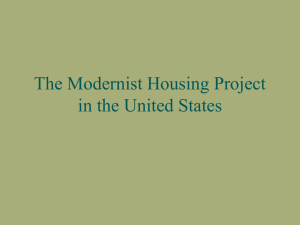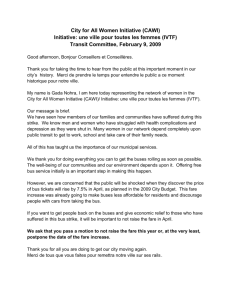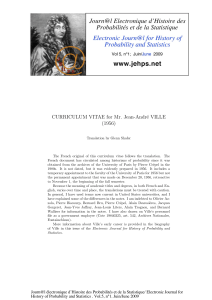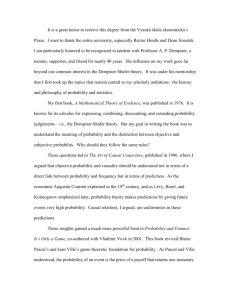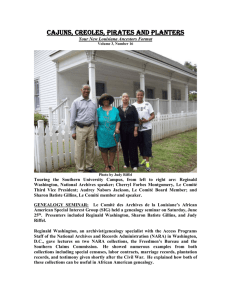Obituary of Jean-Andr´e Ville by Bernard d’Orgeval (1992) Translator’s preface
advertisement
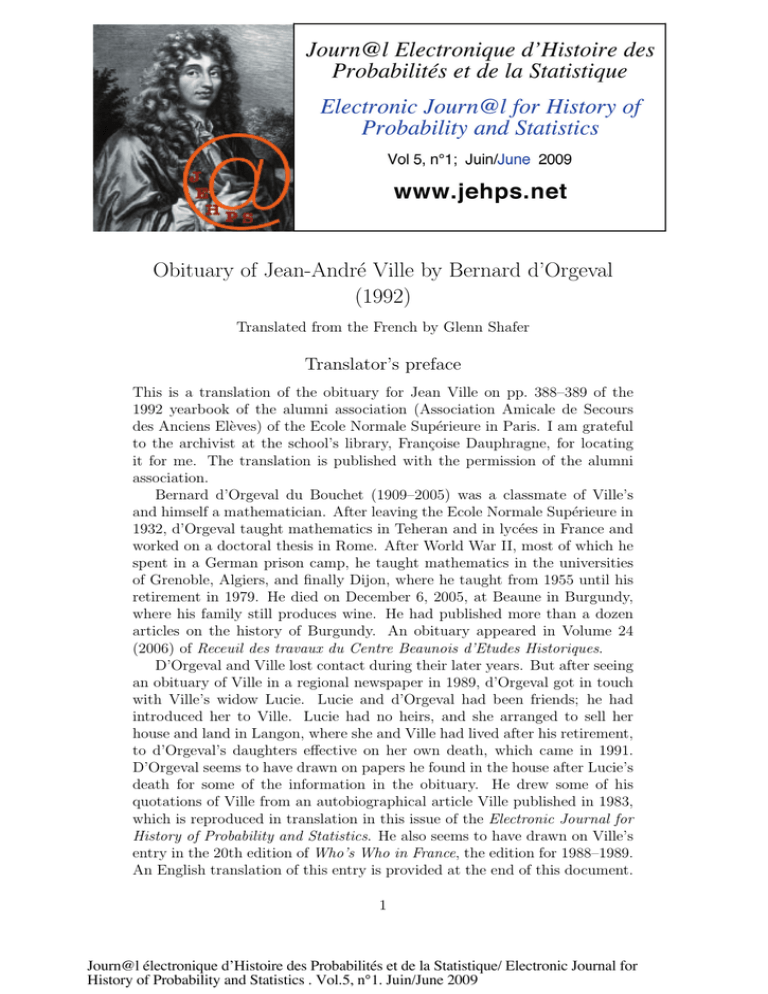
Obituary of Jean-André Ville by Bernard d’Orgeval (1992) Translated from the French by Glenn Shafer Translator’s preface This is a translation of the obituary for Jean Ville on pp. 388–389 of the 1992 yearbook of the alumni association (Association Amicale de Secours des Anciens Elèves) of the Ecole Normale Supérieure in Paris. I am grateful to the archivist at the school’s library, Françoise Dauphragne, for locating it for me. The translation is published with the permission of the alumni association. Bernard d’Orgeval du Bouchet (1909–2005) was a classmate of Ville’s and himself a mathematician. After leaving the Ecole Normale Supérieure in 1932, d’Orgeval taught mathematics in Teheran and in lycées in France and worked on a doctoral thesis in Rome. After World War II, most of which he spent in a German prison camp, he taught mathematics in the universities of Grenoble, Algiers, and finally Dijon, where he taught from 1955 until his retirement in 1979. He died on December 6, 2005, at Beaune in Burgundy, where his family still produces wine. He had published more than a dozen articles on the history of Burgundy. An obituary appeared in Volume 24 (2006) of Receuil des travaux du Centre Beaunois d’Etudes Historiques. D’Orgeval and Ville lost contact during their later years. But after seeing an obituary of Ville in a regional newspaper in 1989, d’Orgeval got in touch with Ville’s widow Lucie. Lucie and d’Orgeval had been friends; he had introduced her to Ville. Lucie had no heirs, and she arranged to sell her house and land in Langon, where she and Ville had lived after his retirement, to d’Orgeval’s daughters effective on her own death, which came in 1991. D’Orgeval seems to have drawn on papers he found in the house after Lucie’s death for some of the information in the obituary. He drew some of his quotations of Ville from an autobiographical article Ville published in 1983, which is reproduced in translation in this issue of the Electronic Journal for History of Probability and Statistics. He also seems to have drawn on Ville’s entry in the 20th edition of Who’s Who in France, the edition for 1988–1989. An English translation of this entry is provided at the end of this document. 1 Journ@l électronique d’Histoire des Probabilités et de la Statistique/ Electronic Journal for History of Probability and Statistics . Vol.5, n°1. Juin/June 2009 VILLE (Jean-André). Born in Marseille, France, June 24, 1910. Died in Blois, France, January 22, 1989.1 Class of 1929.2 Jean-André Ville belonged to a family that originated in the region of Prades. He was very discrete about his personal life, using Jean as his first name in his scientific and administrative career, while he was André to his family. But he sometimes mentioned his vacations at Molitg or Mosset. His father’s assignments as a telegraph inspector led to his beginning his studies at the college of Soissons, and then at the lycée Thiers in Marseille.3 He was the cacique 4 of our class in 1929. In the third year, we were in the same turne 5 in the school’s main building; there I discovered a comrade, a bit taciturn but with great intellectual and moral qualities. Beginning in the second year he was in contact with Emile Borel and Georges Darmois, displaying the considerable attachment to probability and statistics that would orient his scientific career. Like most of the scientists in the class, Ville went to the artillery school at Metz after graduation, to complete his military service in the D. C. A. regiment of Tours. As soon as he was finished with his service, he married and took his young wife to the Institut français in Berlin, where they experienced the beginning of the Third Reich. There they met J. P. Sartre. No doubt we should attribute our comrade’s one “literary” essay, a piece on “the notion of in-itself” that has remained unpublished, to this encounter. The stay in Berlin does not seem to have left much mark on his scientific career, but his next trip, to Vienna in 1934, had a decisive influence on his work. He was an active participant in Karl Menger’s seminar, which he later described as “a marvel.” The organization was very loose, the speakers rambled, and as a result every week brought a new idea, small or large, but always engaging. Our comrade drew the subject of his thesis, Etude critique de la notion de collectif, from a lecture by A. Wald. Fréchet, who had proposed a different topic for him, was gracious enough to accept the thesis. At the same time as he was completing this thesis and teaching special mathematics6 at the lycée Clemenceau of Nantes, Ville had started a seminar on probability, in tandem with Wolfgang Doeblin, “lost during the war, to the greatest grief of Probability.” Emile Borel adopted the seminar, and a wide variety of topics was explored there, such as pseudo prime numbers. Ville defended his thesis on March 9, 1939. As chairman of the examining committee, Borel According to his death certificate, Ville died at Langon, where he lived, on January 20, 1989. The death was registered in Blois two days later. 2 The class that entered the Ecole Normale Supérieure in 1929. 3 Ville’s father was an inspector at Soissons, in northern France, from 1920 to 1923. He was then transferred to Marseille, nearer the family’s home village of Mosset in the Pyrenees. 4 The entering student who had done best in the entrance competition. 5 Room. The words cacique and turne are ENS slang. 6 This term (mathématiques spéciales) refers to the mathematics taught as preparation for the competitions for the Ecole Normale and other elite schools in France. 1 2 Journ@l électronique d’Histoire des Probabilités et de la Statistique/ Electronic Journal for History of Probability and Statistics . Vol.5, n°1. Juin/June 2009 acknowledged the importance of game theory but declared “It is time you should do some analysis.” The second half of 1939 was not the time to return to analysis. Rather it was time to head east to rejoin a battery of the D. C. A. In the first days of the retreat, Ville and a gunner found themselves alone within sight of a German tank, whose occupants spied them in the wheat field where they had hoped to hide. Ville had to surrender, to be imprisoned in Austria in the Oflag XVII A, from which he would be freed in 1942.7 Back in Paris, he would earn an undergraduate degree at the Faculty of Law, reinforcing his belief in an intimate connection between economics and game theory.8 As he himself would write: “Back in France, I heard nothing more about games. . . . I was alone in France, holding on to a subject that interested no one.” Yet it was his interest in one of the elementary cases of game theory that gained Jean Ville a certain notoriety. I will cite Heinz Schleicher on the occasion of the homage to Oskar Morgenstern:9 For two players in a zero-sum game, there thus arises a Maximin, the gain guaranteed by his own strategy, and a Minimax that the adversary can make sure he does not exceed. The Maximin is evidently the smaller. In simple examples one finds that the two bounds are equal; is this the case in general? The difference between the two would have been the last refuge of uncertainty. In 1928, in his article Zur Theorie der Gesellschaftspiele (Math. Ann. 100), J. von Neumann showed they are equal, but his proof was unusually complicated. Ville proposed a much simpler proof, which showed that the problem was merely one of convexity. Ville himself was to explain what happened: “This inspired a certain amount of scorn, except on the part of John von Neumann himself, who noted the situation in Econometrica with the best grace in the world.” Von Neumann even called Ville’s proof “particularly elementary.” After the liberation, the resumption of relations with the United States revealed to Ville that all the subjects that interested him were being cultivated there: operations research, game theory applied to economics, linear programming. “I was cited over there before being cited in France.” Many of these theories were beginning to have industrial applications. Mr. Roger Julia contacted Ville and obtained his help as a scientific consultant to the Alsacienne of mechanical constructions,10 later CIT Alcatel,11 where he would become a vice-president in 1962. Ville’s relations with industrial circles must He was actually freed in June 1941. The law curriculum in France includes a substantial amount of economics. In various documents, Ville gave 1939 as the year he earned his licence in law. 9 The proceedings of the colloquium honoring Morgenstern were published in Economie appliquée, 1983, No. 4. Although Schleicher acknowledges the importance of Ville’s contribution on p. 578 of his introduction, the remainder of this paragraph is drawn not from Schleicher’s comments but from those of Ville himself on pp. 594–595. 10 Société Alsacienne de Constructions Mécaniques. 11 The name Alcatel was originally an acronym for Société Alsacienne de Constructions Atomiques, de Télécommunications et d’Electronique. 7 8 3 Journ@l électronique d’Histoire des Probabilités et de la Statistique/ Electronic Journal for History of Probability and Statistics . Vol.5, n°1. Juin/June 2009 have brought him into some sort of collaboration with the C. E. A.12 He never said anything about being interested in atomic energy or being asked for advice on it, but he had an entry card to Saclay, valid until 1971. His industrial activities seem not to have taken Ville away from teaching. In 1944, he was a maı̂tre de conférences in the Faculty of Sciences at Lyon, interested in a school of actuarial science.13 In 1956, he would be called to the Faculty of Sciences of Paris for a chair in econometrics.14 After the events of 1968, Ville opted for Paris VI, now the Pierre & Marie Curie University, where his chair came to be called Economic Mathematics and Theory of Systems.15 For several years he was an admissions examiner for the Ecole polytechnique, then he served as a tutor there; this was the brief return to analysis so desired by Borel. I will not dwell on his scientific writings:16 Théorie de l’Information in 1956, Théorie des systèmes in 1975, Théorie de l’Hamiltonien en économétrie in 1980, Théorie des Jeux, dualité et développement in 1983, and Matrices technologiques in 1986. The dates of these works, many of them after his retirement,17 show how much he wanted to see developed theories that had been considered, fifty years earlier, to be “an honorable pastime for celebrated mathematicians.” Ville’s contribution to the development of economic mathematics had been honored by a Montyon prize in statistics. Several years before his retirement, Ville had left Paris to settle in the southern edges of Sologne. This return to the countryside was blighted by a fire, which required the construction of a new house and completely destroyed a beautiful and well-stocked library. Then there was a long and unhappy illness, which took him away on January 22, 1989, in spite of the loving care of the woman he had married more than sixty years earlier. His ashes rest in that Sologne earth he chose. Bernard d’ORGEVAL 12 Commissariat à l’Energie Atomique. Together with Claude Fourgeaud, Ville directed a program at the Institut National des Sciences et Techniques Nucléaires, an educational branch of the CEA. It awarded a master’s degree (DEA) after one year of courses in operations research and econometrics. According to a document in Ville’s personnel file as a government employee (Cote 19840325, art. 542, Archives Nationales, Fontainebleau), he was a scientific consultant at the CEA in 1970. 13 The ISFA (Institut de Science Financière et d’Assurances) was founded at Lyon in 1930. 14 Ville was appointed to the faculty of the University of Paris in 1956. He was appointed to a chair in 1959. 15 After demonstrations by students and workers in 1968, the University of Paris was split into about ten separate universities, sometimes still known by the numbers then given them. 16 For information on these writings, see the translation below of Ville’s entry in Who’s Who in France. 17 Ville retired from the University of Paris in 1978. 4 Journ@l électronique d’Histoire des Probabilités et de la Statistique/ Electronic Journal for History of Probability and Statistics . Vol.5, n°1. Juin/June 2009 Ville in Who’s Who in France Ville first appeared in Who’s Who in France in the 9th edition, for 19691970, and he last appeared in the 20th edition, for 1988-1989. D’Orgeval appears to have drawn on the entry in the 20th edition. Here is a translation: VILLE (Jean, André), Mathematician. Born 24 June 1910 in Marseille (Bouches-du-Rhône). Son of Baptiste Ville, telegraph inspector, and of Mrs. Ville, born Maria Vernet. Married 7 October 1933 to Miss Lucie Ernoult. Studies: Soissons College, Thiers Lycée in Marseille, Ecole normale supérieure, Universities of Berlin and Vienna, Karl Menger’s seminar, Paris Law School. Degrees: Agrégé in mathematical sciences, License in law, Doctorate in mathematical sciences. Career: Professor of special mathematics (1938), Consultant to the Société alsacienne de constructions mécaniques (1942), Professor in the Pierre and Marie Curie University at Paris (mathematical economics) (1956), Vice president (1962) at Alcatel. Works: Founder of the Paris seminar in the probability calculus (1939),18 works on the theory of the collective, martingales, and game theory (1937),19 the theory of information (1950),20 the theory of systems (1975),21 the theory of the Hamiltonian in econometrics (1980),22 game theory, duality, and economic growth (1983),23 technological matrices (1986).24 Decorations: Officier des Palmes académiques.25 Distinctions: Monthyon prize for statistics.26 Address: Private: La Boulaye, Langon, 41320 Mennetou-sur-Cher. The correct date is 1937. Ville’s work on these topics appeared in print in 1936, 1938, and 1939. 20 Although Ville published papers on information theory in 1950, he is probably referring here to work that later appeared in Annales de l’Institut Henri Poincaré 14(2):61–143, 1954. 21 Ville wrote a paper with this title that was submitted to a journal but never published. 22 Ville drafted a book with this title that was never published. 23 Economie appliquée 36(4):593–609, 1983. Reproduced in translation in this issue of the Electronic Journal for History of Probability and Statistics. 24 Cahiers de l’Institut de Sciences Mathématiques et Économiques Appliquées. Série EM: Économie Mathématique et Économétrie 10(11):5–13, 1986. 25 Students from the Ecole Normale Supérieure who succeed in the agrégation and then teach receive this honor on the basis of seniority. Others may receive it on the basis of particular achievements. 26 The French Academy of Sciences awarded Ville the Montyon prize for statistics in 1945. 18 19 5 Journ@l électronique d’Histoire des Probabilités et de la Statistique/ Electronic Journal for History of Probability and Statistics . Vol.5, n°1. Juin/June 2009
